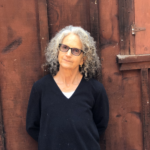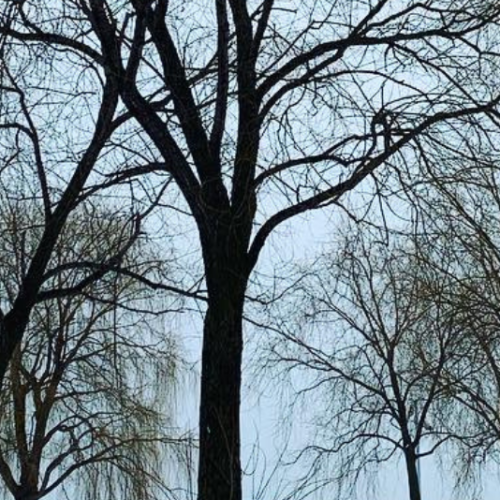I.
Playland
was Poland with the o pulled out and play put in, echoing the home country but safer and more fun. Each Sunday, we begged our parents to take us there, where the two families converged like pilgrims on the western edge of Golden Gate Park, standing at the Pacific Ocean to watch the water froth and smash against the sand. We kids pleaded while the grownups debated Playland amongst themselves in whispered Polish. They didn’t need to whisper; none of us kids spoke any except dzien dobre. Some Sundays, my mother caved, although my father rolled his eyes: all culture had been left behind in the concert halls and museums of his Polish youth. We ran past their marital divide, and I chanted “dzien dobre, dzien dobre” like a prayer to the beat of my pounding feet. We ran across the street to buy tickets to Playland before our parents could pull us away. Playland was sooty air and bits of gluey gum on the tarmac, “like the train stations in Warsaw,” my mom would say, crinkling her nose. Playland was Laffing Sal, rocking life-sized in her glass chamber, her howls echoing in the fog, tears frozen on her sculpted cheeks. Playland was the Big Dipper, shuddering and trembling under my thighs as the car carried me high over the city (“dzien dobre” I whispered to my mom, waiting below). It was the Mad Mine, my fingers clutching the moist metal guardrail as the train raced us through brick walls and under rock piles. Playland was blasting pipe organ music that sounded nothing like the strains of Chopin coming from my father’s library. Playland was the Hall of Horrors, stumbling past a trail of ghouls, ending in a sea of mirrors with hundreds of duplicated me’s staring back, each of my thousand legs a wavy stilt and each belly round and wide (“dzien dobre” I murmured, searching for my true pair of eyes). Playland was using my last ticket to buy a pink cloud of cotton candy: watching as the warm web spun and puffed onto a paper roll, gripping the end of the cone weighed down with its woven nest of translucent threads, drawing off a pinch between thumb and index finger to let it melt against my teeth, and willing my mom to take a taste, so she too might know the way sweetness disappears the moment it touches her tongue, the way a country’s name disappears and can be forgotten.
II.
Ancestry
by which I mean lineage and also my own survival, hounds me. Not in the hearty map-your-family-tree way, and not in the way that the word family evokes a robust, flourishing tree with a mass of curving, spinning limbs and leafy green parts, not in those ways as I sit at my writing desk, by which I mean to say not my writing desk, rather the desk of my mother, the desk I coveted during her lifetime.
I gazed at this desk through the droop of my eyes as my mother grew older but didn’t age; she grew livelier and more dazzling by the day while my hips spread, my feet flattened, my face slackened. I skipped breakfast and ate one apple for lunch to attain a fine angularity, but that didn’t get me my mother’s beauty or her fiery energy, although I did eventually get the desk.
And now, it doesn’t sit right: all angles, sharp corners, reflective glass, jutting shelves, no trace of her in the plexiglass, no stain of ownership, no sign of the classiness she lent everything she touched like Midas, but for style. This touch did not travel with the desk to my bedroom. It stands against a window where I sit, leaves of first-draft pages carpeting the floor below. Pages glaring white with scribbles of blue mostly x-ed out.
On the desk, I keep a bonsai with stunted gnarly limbs that reach for graveled dirt underneath. Limbs should reach skyward, so I clip the tiny new growth with sewing scissors, murmuring a kaddish for my father’s father, the furrier who died on a stone floor in a Warsaw prison.
My father left me the bonsai. We had tended it together. When I was little, we drove in silence to the nursery as if we were on our way to a wake, not to select a tree that needed nurturing, leaving me to wonder whether it was nature or nurture that caused our bonsais to list and long for the earth to start over with new roots burying deep in the dirt. “That’s okay,” I whisper to the branches, “I don’t know where to find roots.”
Maybe not here at this desk, its hard surface still sparkling. The thing about glass is its transparency reveals nothing, not like the old wooden school desk next to mine in third grade where the boy carved a swastika with the pointy end of a compass. I watched his handiwork, and the sound of one hundred sirens rang in my head. No one else seemed the least bit bothered and apparently didn’t know that WW3 could be starting any second. “Not here in America,” said my mother and father.
I never told them about the swastika at school; it could break them. “Oh, just live a little,” said my mother, but how do you live a little when there are too many words for the absence of ancestors by which I mean genocide of ancestors or extermination or mass murder or holocaust or
III.
Your daughter delivers
the news, waving the plastic strip in your face; you glimpse two pink stripes, and you’re dizzy with the thrill of it. Tingly in the thick of it. It’s a rush, but there’s no rush; still, you can’t help but fuss. The size of a pea, a walnut, a tangerine, a pomelo. Beyond light and sound, unbound, the ultrasound. Wavy lines mark a nose and four limbs, gray marks a fetus. An ocean’s heartbeat, its swell, your heart swells. Moods rise and fall and rise again. The belly swells. The heat swelters. You text too much. You suffocate. Ask permission before you touch. Don’t even think of touching,
she aches. She’s bearing the child. You’re bearing the brunt. You supplicate, she replicates. You meditate. You hold your breath; don’t exhale yet
exaltation, the top of the world, so grand, you’re swooning, it’s soothing, forsooth. You go to Target. You buy her the stretch panel jeans, the gathered dress. You buy the car seat, the rock-a-bye bassinet, the cushioned perambulator, the tallest highchair. You break the bank. You bake bread. You make soup, lentils and squash. Celery and kale. The pot fills. The heart overflows. The belly bursts, an ancestor is born.

Peggy Stone
Peggy Stone lives in the San Francisco Bay Area, and writes poetry, short fiction, creative nonfiction and memoir. After a legal career representing adults and youth in the criminal justice and foster care systems, she turned her attention to her passion for writing. She currently teaches memoir classes at The Writers Studio.



